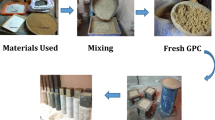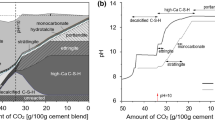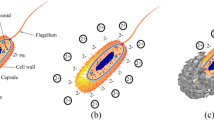Abstract
The properties of low-heat Portland cement concrete(LHC) were studied in detail. The experimental results show that the LHC concrete has characteristics of a higher physical mechanical behavior, deformation and durability. Compared with moderate-heat Portland cement(MHC), the average hydration heat of LHC concrete is reduced by about 17.5%. Under same mixing proportion, the adiabatic temperature rise of LHC concrete was reduced by 2 °C–3°C,and the limits tension of LHC concrete was increased by 10×10−6–15×10−6 than that of MHC. Moreover, it is indicated that LHC concrete has a better anti-crack behavior than MHC concrete.
Similar content being viewed by others
References
C X Yu, Z Kong. Research on the Causes of Cracks in Mass Concrete and Control Measures [J]. Low Temperature Architecture Technology (China), 2005 (5): 112–113
A A Almusallam, M Maslehuddin. Effect of Mix Proportions on Plastic Shrinkage Cracking of Concrete in Hot Environments[J]. Construction and Building Materials, 1998 (12): 353–358
Xu Jing’an, An Zhiwen. Countermeasure of Temperature Crack of Mass Concrete[J]. Journal of Hebie Institute of Architectural Engineering, 2005,23(3):36–40
Peng Weibing, Ren Aizhu. Effects and Evaluation on Cracking of Concrete Incorporating Supplementary Cementitious Materials[J]. Concrete (China), 2005 (6): 50–64
Xiao Reimin, Zhang Xiong. Effect of Binder on Drying Shrinkage of Concrete [J].China Concrete and Cement Products, 2002 (5): 11–13
Ye Qing, Chen Xin. Research on the Expansive Mechanism of Moderate Heat Portland Cement with Slight Expansion [J].Journal of the Chinese Ceramic Society, 2000, 128(4):335–347
Shi Xun. Application of Slight Expansion Cement on Concrete of Stage II Works of the Three Gorges Project [J]. Cement (China). 2002 (5): 12–14
Nagaokas, Mizukosui M. Property of Concrete Using Beliterich Cement and Ternary Blended Cement [J]. Journal of the Society of Materials Science, Japan, 1994, 43(491): 488–492
Ge Juncai. Technology Progress of Cement and Concrete [M]. Beijing: China Building Material Industry Press, 1993: 275–276
Metha P K. Investigation on Energy-saving Cement[J]. World Cement Technology, 1980, 1(3): 166–177
Taylor. Cement Chemistry[M]. London: Academic Press, 1990:142–152
Sui Tongba, Liu Kezhong. A Study on Properties of High Belite Cement [J]. Journal of the Chinese Ceramic Society, 1999, 127(4): 488–492
Yang Nanru, Zhong Baixi. Study on Active-C2S[C]. Symposium on Cement,1983:180–185
Yang Huanquan, Li Wenwei. Research and Application of Hydroelectric Concrete[M]. Beijing, China Water Power Press, 2004:393–394
E Ringot, A Bascoul. About the Analysis of Micro-cracking in Concrete[J]. Cement and Concrete Composites, 2001 (23): 261–266
Li Guangwei. Assessment for Anti-Crack Performance of Concrete [J]. Advances in Science and Technology of Water Resources (China), 2001, 21(2): 33–36
Liu Shuhua, Fang Kunhe. Summarization of Norm of Crack Resistance of Concrete[J]. Highway (China), 2004 (4): 105–107
Frank Collins, J G Sanjayan. Cracking Tendency of Alkali-Activated Slag Concrete Subjected to Restrained Shrinkage[J]. Cement and Concrete Research, 2000 (30): 791–798
Author information
Authors and Affiliations
Corresponding author
Additional information
Funded by the National Natural Science Foundation of China (No. 50539010)
Rights and permissions
About this article
Cite this article
Yang, H., Wang, Y. & Zhou, S. Anti-crack performance of low-heat Portland cement concrete. J. Wuhan Univ. Technol. 22, 555–559 (2007). https://doi.org/10.1007/s11595-006-3555-7
Received:
Accepted:
Issue Date:
DOI: https://doi.org/10.1007/s11595-006-3555-7




